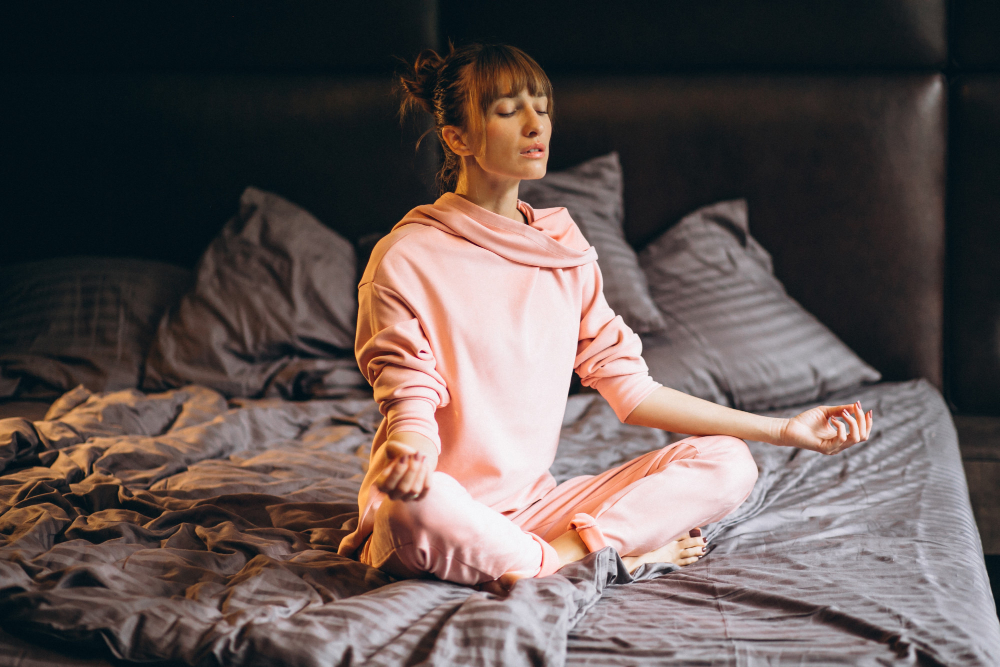The Secret to Deep Sleep with Guided Meditation Practices

Are you in search of a peaceful night’s sleep? You’re not alone. Many struggle with sleep, but there’s hope. Discover how guided meditation sleep techniques can transform your bedtime routine. Keep reading for practical tips and a step-by-step guide for a restful night. Let’s dive in.
The Foundation: Sleep and Meditation
Why Quality Sleep Matters
Sleep is crucial for health and well-being. It repairs the body, consolidates memories, and rejuvenates the mind. However, many people find a good night’s sleep elusive. Stress, anxiety, and external factors often stand in the way. This is where meditation, mainly guided meditation sleep practices, comes into play.
The Power of Meditation for Sleep
Meditation calms the mind and body, setting the stage for deep sleep. It reduces stress, eases anxiety, and helps manage the thoughts that often keep us awake. Through mindfulness and relaxation techniques, guided meditation sleep practices can be the key to unlocking restful nights.
Step-by-Step Guide to Better Sleep with Meditation
Preparing Your Sleep Environment
First, create a serene sleep environment. Keep your bedroom dark, calm, and quiet. Invest in comfortable bedding and remove electronic devices. This physical setup complements the mental preparation guided meditation sleep practices offer.
Establishing a Pre-Sleep Routine
Consistency is key. Establish a pre-sleep routine that signals to your body it’s time to wind down. Incorporate gentle stretches or a warm bath. End your routine with a guided meditation sleep session to relax your mind entirely.
Choosing the Right Guided Meditation Sleep Practice
Various guided meditations are designed for sleep. Look for ones that focus on deep breathing, body scanning, or visualization techniques. Select a voice and style that resonates with you, ensuring a more personalized and effective experience.
Practicing Mindfulness and Relaxation Techniques
Mindfulness involves being present and fully engaging with the moment. Practice mindfulness during the day to manage stress better. At night, relaxation techniques such as deep breathing or progressive muscle relaxation can be integrated into your guided meditation sleep practice to prepare your body for sleep further.
Incorporating Breathing Exercises
Breathing exercises are a cornerstone of meditation. They signal your body to relax and transition into a state conducive to sleep. To enhance the effectiveness of your guided meditation sleep practice, incorporate deep, rhythmic breathing.
Advanced Tips for Enhanced Sleep
Journaling Before Meditation
Consider journaling before your meditation practice. Writing down thoughts and worries can clear your mind, making it easier to engage in meditation. This process complements guided meditation sleep practices by addressing mental clutter directly.
Tailoring Meditation to Your Needs
Not all meditation practices work for everyone. Don’t hesitate to tailor your guided meditation sleep routine. Adjust your practice’s length, style, or focus to match your personal preferences and needs.
Combining Meditation with Other Sleep Hygiene Practices
Meditation is powerful but most effective when combined with good sleep hygiene. Maintain a consistent sleep schedule, limit caffeine and screen time before bed, and engage in daily physical activity. These practices and guided meditation sleep techniques create a holistic approach to better sleep.
The Science Behind Meditation and Sleep
Research supports the effectiveness of meditation for improving sleep. Meditation activates the parasympathetic nervous system, which slows the heart rate and lowers blood pressure, creating physiological conditions ideal for sleep.
Studies show that regular meditation can improve sleep quality, reduce the time it takes to fall asleep, and decrease the frequency of waking up at night.
Overcoming Common Challenges
Starting Small
If meditation is new to you, start small. Even a few minutes can be beneficial. Gradually increase the duration of your guided meditation sleep practice as you become more comfortable.
Dealing with Distractions
Distractions are normal. If you find your mind wandering during meditation, gently guide it back to your breath or the guided meditation’s instructions. With practice, you’ll find it easier to maintain focus.
Consistency is Crucial
Regular practice is vital to experiencing the benefits of guided meditation sleep techniques. For the best results, make it a non-negotiable part of your nightly routine.
Conclusion: Unlocking the Door to Restful Nights
Meditation offers a simple, effective way to improve sleep quality. Incorporating guided meditation sleep practices into your nightly routine can ease your mind, relax your body, and set the stage for deep, restorative sleep. Remember, consistency and personalization are key. Experiment with different practices and find what works best for you.
Now, it’s your turn to take action. Try implementing these tips tonight and observe the difference. Share your experiences in the comments, or explore our range of meditation and wellness products designed to enhance your sleep further. Your journey to better sleep starts now. Engage, share, and explore – restful nights and energized mornings await.
Read More:
Benefits of Guided Sleep Meditation
Related Posts

Excel in Online Yoga Classes

Achieving Radiant Skin with The Hot Yoga Glow
About Us

